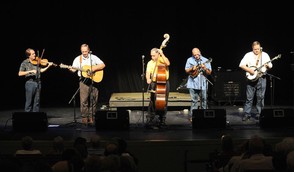

Local band Duty Free plays a tribute to Tennessee Ernie Ford at the Paramount Center for the Arts.
*** Published Monday, Sept 20 in the Bristol Herald Courier. ***
Ernest Jennings Ford was born in Bristol, Tenn., on Feb. 13, 1919.
The world came to know him as Tennessee Ernie Ford, star of music and television. Bristol knows him as its most famous son.
And so amid the grandeur of the 10th annual Rhythm and Roots Reunion, Sunday's brief though warm tribute to Tennessee Ernie Ford at the treasured Paramount Center for the Arts struck an appropriate chord. Bristol bluegrass band Duty Free performed, Dave Carter emceed and Tim Buchanan spoke.
"Amongst all the country music stars, Tennessee Ernie Ford is about the only one that is a Bristol native," said Buchanan, co-founder and chairman of Believe in Bristol. "We should have done more when he was living."
Ford died on Oct. 17, 1991. Earlier that year, he made his final visit to Bristol when he appeared at the Paramount for the reopening of the Bristol landmark.
"Everybody loved Ernie Ford," said Hal Boyd of Duty Free.
A few minutes past 1 p.m. Sunday, Duty Free strode on stage to gentle applause. The five-man band barreled into Ford's first charted single, 1949's "Tennessee Border," a rousing look back at Ford's early days of hillbilly boogie.
With Charlie Powers singing lead, Duty Free then offered a contemplative "Sweet Hour of Prayer." While certainly no copy of Ford's grand rendition, Duty Free's take proved nonetheless comforting and sweet.
When the applause quieted, Powers introduced the next song by looking back into his own childhood.
"My Mom said this was the first thing I ever sang," Powers said.
Boyd with upright bass in hand, chimed in with a memory, too.
"In 1956, I got me a coon skin cap," Boyd said.
And with that, the boys broke into "Ballad of Davy Crockett," which hit huge for Ford in 1955. Duty Free paid dutiful justice to the classic with fitting grins and fun all around.
There was no lag during the half-hour program. An instrumental "How Great Thou Art" acknowledged Ford's career-long love of gospel music while a goosebump gospel take on "Precious Memories" punctuated the fact.
Ah, but the best came last.
"This isn't Tennessee Ernie Ford," Powers said. "This is Hickory Tree Hal Boyd."
Boyd stepped forth to the microphone. He snapped his fingers, opened his mouth and out emerged the oh so familiar line, "Soooooome people say a man is made out of mud, a poor man is made out of muscle and blood..."
Yep, Ford's signature song, "Sixteen Tons," reverberated again from a stage in the city of his birth.
Boyd's no Ford. But he nailed Ford's timeless tune from a bygone era that lived again if but for a few moments Sunday at the Paramount.